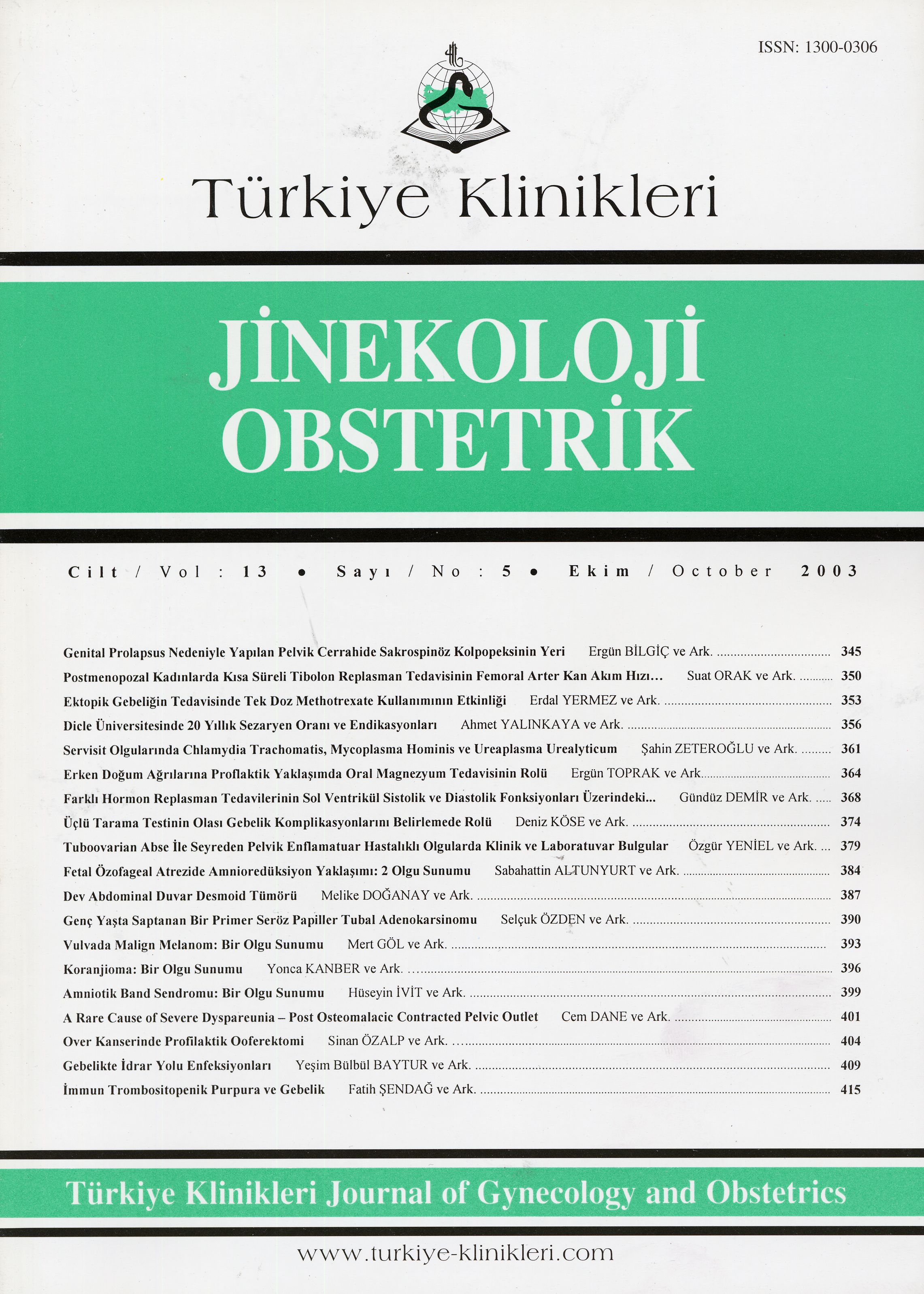Open Access
Peer Reviewed
ARTICLES
3607 Viewed1836 Downloaded
Urinary Tract Infections In Pregnancy
Gebelikte İdrar Yolu Enfeksiyonları
Turkiye Klinikleri J Gynecol Obst. 2003;13(5):409-14
Article Language: TR
Copyright Ⓒ 2025 by Türkiye Klinikleri. This is an open access article under the CC BY-NC-ND license (http://creativecommons.org/licenses/by-nc-nd/4.0/)
ÖZET
İdrar yolu enfeksiyonları, gebelikte en sık ortaya çıkan medikal komplikasyondur. Semptomatik ya da asemptomatik olabilir. Asemptomatik bakteriüri prevalansı gebelikte değişmemekle birlikte, asemptomatik enfeksiyonun semptomatik ve ciddi enfeksiyona ilerleme riski gebe olmayan hastalara göre dört kat daha yüksektir. Diğer taraftan gebelikte idrar yolu enfeksiyonları, erken doğum eylemi ve düşük doğum ağırlıklı bebeklerin oranını artırmaktadır ve yenidoğanın motor ve mental gelişimi üzerine olumsuz etkileri olduğu söylenmektedir. Tüm bu nedenlerden dolayı gebelikte idrar yolu enfeksiyonlarının taranmalı ve uygun şekilde tedavi edilmelidir. Genel olarak kabul gören tarama yöntemleri, idrar kültürü, idrar çubuğuyla lökosit esteraz, nitrit veya pH araştırmasıdır ve bu yöntemlerden idrar kültürü hala en çok kabul gören tarama şeklidir. Tarama yöntemi ne olursa olsun, gebelikte asemptomatik bakteriüri tespit edildiğinde tedavisinin yapılması gereklidir.
İdrar yolu enfeksiyonları, gebelikte en sık ortaya çıkan medikal komplikasyondur. Semptomatik ya da asemptomatik olabilir. Asemptomatik bakteriüri prevalansı gebelikte değişmemekle birlikte, asemptomatik enfeksiyonun semptomatik ve ciddi enfeksiyona ilerleme riski gebe olmayan hastalara göre dört kat daha yüksektir. Diğer taraftan gebelikte idrar yolu enfeksiyonları, erken doğum eylemi ve düşük doğum ağırlıklı bebeklerin oranını artırmaktadır ve yenidoğanın motor ve mental gelişimi üzerine olumsuz etkileri olduğu söylenmektedir. Tüm bu nedenlerden dolayı gebelikte idrar yolu enfeksiyonlarının taranmalı ve uygun şekilde tedavi edilmelidir. Genel olarak kabul gören tarama yöntemleri, idrar kültürü, idrar çubuğuyla lökosit esteraz, nitrit veya pH araştırmasıdır ve bu yöntemlerden idrar kültürü hala en çok kabul gören tarama şeklidir. Tarama yöntemi ne olursa olsun, gebelikte asemptomatik bakteriüri tespit edildiğinde tedavisinin yapılması gereklidir.
ANAHTAR KELİMELER: İdrar yolu enfeksiyonları, Gebelik, Bakteriüri
ABSTRACT
Urinary tract infections are the most common medical complication of pregnancy. It may be symptomatic or asymptomatic. Although the prevalence of asymptomatic bacteriuria remains unchanged, the progression to symptomatic urinary tract infection occurs four-fold higher than in nonpregnant patients. On the other hand, urinary tract infections in pregnancy increase the rate of preterm delivery and low birth weight infants and it is postulated that the urinary tract infections have a negative impact on mental and motor development of the newborn. Because of all these reasons, urinary tract infections should be screened and treated appropriately. Generally accepted screening methods are urine culture, urine dipstick analysis for leukocyte esterase, nitrites and pH. Among these the most valuable method is the urine culture. The asymptomatic bacteriuria should be treated with appropriate antibiotics.
Urinary tract infections are the most common medical complication of pregnancy. It may be symptomatic or asymptomatic. Although the prevalence of asymptomatic bacteriuria remains unchanged, the progression to symptomatic urinary tract infection occurs four-fold higher than in nonpregnant patients. On the other hand, urinary tract infections in pregnancy increase the rate of preterm delivery and low birth weight infants and it is postulated that the urinary tract infections have a negative impact on mental and motor development of the newborn. Because of all these reasons, urinary tract infections should be screened and treated appropriately. Generally accepted screening methods are urine culture, urine dipstick analysis for leukocyte esterase, nitrites and pH. Among these the most valuable method is the urine culture. The asymptomatic bacteriuria should be treated with appropriate antibiotics.
MENU
POPULAR ARTICLES
MOST DOWNLOADED ARTICLES





This journal is licensed under a Creative Commons Attribution-NonCommercial-NoDerivatives 4.0 International License.










